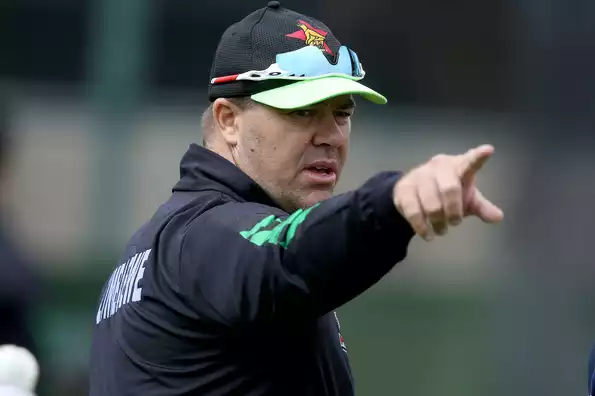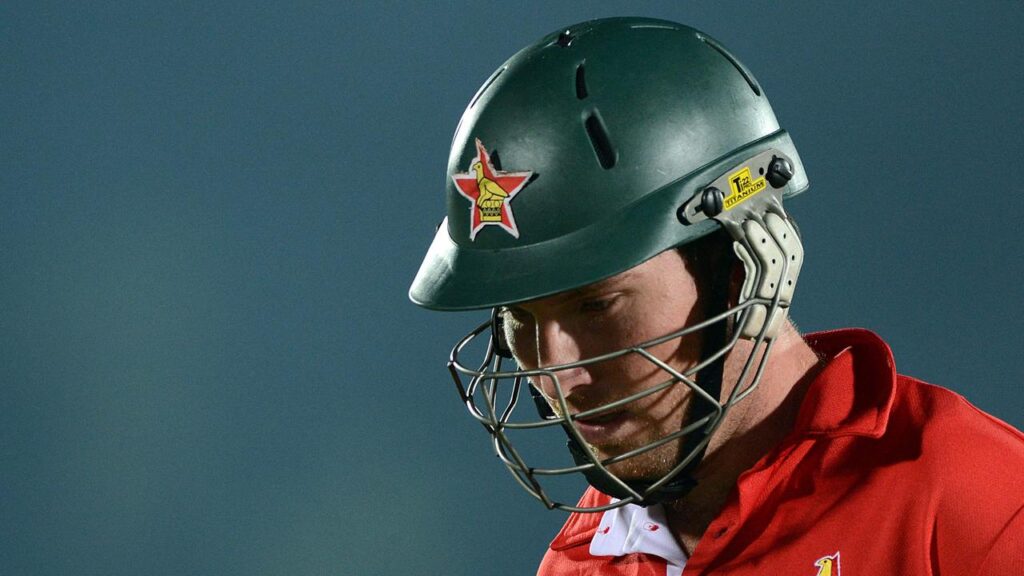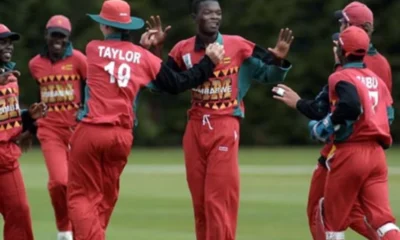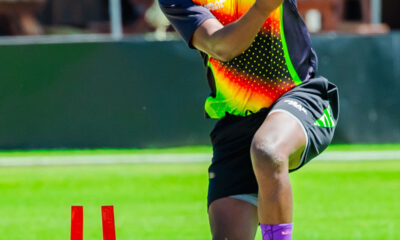
Sports
How illegal betting syndicates’ persistent attempts on Zimbabwe helped world cricket’s ongoing cleansing process
Published
1 year agoon
By
NewsHawksHARARE – It was the most hair-raising phone call Luke Jongwe will ever receive in his cricket career and, as you might imagine, it put the fear of God in him.
ENOCK MUCHINJO
Did the surprise caller, in his right mind, realise just what he was trying to get the Zimbabwe national cricket team bowler into? Zimbabwe first made global match-fixing headlines through football, the country’s foremost sporting code, over 15 years ago.
Between 2007 and 2009, the country’s national football team toured Southeast Asia to play in fixed matches organised by an Asian betting syndicate controlled by convicted Singaporean match-fixer Wilson Raj Perumal.
Bewilderingly, senior administrators of the Zimbabwe Football Association (Zifa) were behind the tours of shame. President Emmerson Mnangagwa’s niece Henrietta Rushwaya, recently implicated in Al Jazeera’s Gold Mafia investigative documentary revealing the alleged massive looting of Zimbabwe’s gold, was at the helm of Zifa during the dirty period.
The officials made quite a fortune from it, whilst players and coaches were also paid varying sums of money to play in a manner that suited the fixers’ gambling activities in this scam, infamously known as Asiagate.
Because Zimbabwe does not have laws to prosecute such crimes, the Asiagate cases fell away and heavy bans that had been imposed were lifted after some years. It is something that the Sports and Recreation Commission (SRC), Zimbabwe’s premier sports regulatory body, is trying to correct.
“Zifa (the Asiagate scandal) was an eye-opener,” SRC director-general Eltah Nengomasha commented for this Voluntary Media Council of Zimbabwe (VMCZ) investigative project.
“As long as we do not have laws to curb these illegal sporting activities, it will remain an issue. We are working with all the different national sporting federation to have ethics committees.”
When Asiagate exploded, Jongwe – who is also a football fan like many people in Zimbabwe – was a young budding cricketer. He read about the widely-publicised scandal, and learnt at a young age of the dire consequences of succumbing to the whims of match-fixers.
So for a moment when he received the call in 2022, a perplexed Jongwe tried to force himself into believing that the person on the other side of the line was having a barely funny attempt at humour by dangling an offer for a most heinous crime in professional sport: match-fixing.
But Jongwe quickly figured that his caller, Edward Mupangano, was not at all trying to amuse both of them. He, in fact, was dead serious. Little-known club cricketer Mupangano, distantly familiar to Jongwe, revealed in the initial phone call that he had recently befriended some visiting and rich Indian nationals who desired to “do business” with the national team star.
The time was August 2022, in the middle of an exciting period in Zimbabwean cricket, when a rejuvenated national team was drawing record crowds in both Harare and Bulawayo.
India’s cricket team, one of world cricket’s favourite visiting teams, was touring for three One-Day Internationals (ODIs) in the Zimbabwean capital. As is the case for many years whenever “Team India” is in town, thousands of the Indian diaspora across other parts of Africa travel to Zimbabwe to watch and, if lucky enough, mingle with their sporting heroes from the ancestral land. Some of them, who include Mupangano’s “friends”, go the extra mile, literally, and fly all the way from India for the experience of a lifetime.
Straight to the point, the offer was tabled: Jongwe was to receive payment of US$7 000 for bowling in a certain way during one of the three ODIs at Harare Sports Club. Mupangano, for his facilitation role, would be paid US$3 000 by the generous guys from India.
If they succeeded in winning over Jongwe, the travelling illegal bookmakers – who had no links whatsoever with the touring Indian team or the Board of Control for Cricket in India (BCCI) – then placed bets on the pre-arranged actions and profit several-fold from their initial investment.
Jongwe, who is a relatively well-paid professional cricketer by Zimbabwean standards, and no fool, instantly knew what he needed to do The 28-year-old pretended to be interested, and said “yes” to Mupangano.
He then promptly reported the approach to the security section of Zimbabwe Cricket (ZC). Any lower league cricketers anywhere in the world today, let alone an international like Jongwe – courtesy of anti-corruption sessions that are constantly being rolled out – are well-educated about the extremely grave consequences of any involvement with betting rackets.
So even if a player does not comply with the match-fixers, choosing not to report the approach is an offence under the anti-corruption code of the International Cricket Council (ICC). It normally attracts a ban of between three to eight years.
According to the ICC, reporting timely is hugely important because the “corrupt activity can be disrupted at the earliest possible opportunity”, or it can help uncover hidden dirt in incidents that other players elsewhere would have participated in.

This is indeed an effective method and, as this investigation produced with support from the VMCZ investigative journalism fund on transnational crimes will exclusively show in this fact-finding story, an earlier approach made to another Zimbabwean player three years before that of Jongwe led to the ban of national team cricketers from another country who had agreed to a deal with the same syndicate.
In Jongwe’s instance, Mupangano was arrested soon after the report was launched, and the 28-year-old from Harare admitted having approached the Zimbabwe bowling all-rounder on behalf of the Indian businessman.
This investigation can reveal that police officers and other law enforcement agencies, guided by Mupangano, fished out the three Indian nationals at an apartment they were renting in the Avenues residential area of Harare.
Cornered – WhatsApp exchanges with Mupangano still in their mobile phones – the Indian bookies also immediately admitted their offence, and pleaded for mercy. The VMCZ investigation was shown pictures of the three on the scene of their arrest, paraded in the apartment — all shirt-less, scared-as-hell and grim-faced — holding their Indian passports for the photographs.
The images however could not be released to us for this project. Unlike neighbouring South Africa, Zimbabwe does not have legislation that outlaws match-fixing. So no prosecution took place in the country following the arrest of the Indian bookies, who were however ordered out of the country, and barred by immigration from entering again for a lengthy period. But this is expected to change soon.
“We are working towards enactment of a sports and integrity Bill into law,” added Nengomasha.
“That will be a welcome development. It’s at an advanced stage as we speak. It will address things like match-fixing, drugs and doping, sexual abuse, all that kind of stuff of a criminal nature in sports. Right now, we have people getting banned by ICC and Fifa, but right here in our own country we cannot do anything about it.”
In the Jongwe case, a report was subsequently made to the ICC Anti-Corruption Unit, and the Zimbabwe Anti-Corruption Commission (Zacc).
The ICC investigated, charged, and banned the trio from all forms of cricket. Mupangano, for his trouble, was in February 2023 banned by ZC for five years for his unsuccessful attempt to involve Jongwe in the spot-fixing deal.
The cunning syndicates, we established in findings of this VMCZ investigation, possess other crafty methods of making money through betting on matches as they take place, to cash in during their stay in the country.
Arriving in Zimbabwe as fans, they strategically position themselves in the stadium to have a good view of the playing field, to flight instant bets. For instance, let’s say the batsman has played a pull shot between the mid-wicket and fine-leg.
The bookmaker, quick as a flash – taking advantage of the slight delay in TV or internet live feed – places a bet on the piece of action as it has happened, betting on illegal gambling sites.
The illegal gaming sites are a menace throughout the world because not only do they deprive the legal industry and state of revenue running into millions to billions of dollars, there is absolutely no control over such scourges as money laundering. Instant betting on illegal sites is just one of the syndicates’ means to earn extra money.
But where the big money is, of course, is corrupting players for spot-fixing – directly and indirectly. These unlawful operations mostly prefer using people they think are close to the players, as in Mupangano’s case.
It is not unusual to see fringe players in the domestic structure mingling with the internationals, as the same club cricketers are utilised for practice purposes as net session bowlers.
This modus operandi resulted in the busting of a match-fixing attempt that had a former Indian cricketer and four United Arab Emirates national team players being slapped with bans following an ODI series in Zimbabwe in April 2019.
The corrupters from India, we can exclusively report here, had their cover blown and arrested in Harare after being reported by Zimbabwean player Tarisai Musakanda. Mehar Chhayakar, an Indian cricketer who had previously played at domestic level in the UAE, was already working with some of the players in the Middle East side on the Zimbabwe tour, won 4-0 by the hosts in Harare.
Attempting to spread their dirty network into the Zimbabwe side for extra gains, Chhayakar and his team approached Musakanda, who did not feature in that particular series.
They offered the unselected Zimbabwean batsman an attractive incentive to broker a fixing deal with his playing colleagues. Musakanda duly reported the unsolicited advances to ZC, leading to the arrest of Chhayakar and three others at yet another rented Avenues flat, showing a pattern of the bookies’ preferred form of accommodation when they are in Zimbabwe for “business”.
As opposed to the busier city hotels, there is less chances of scrutiny in the quieter corners of the Avenues, where their prospective “clients” can come in and out for meetings without drawing attention from the wider public.
To the shock of the Zimbabwean authorities, all four men nabbed in Musakanda’s report were accredited VIP officials of the ongoing series between the Zimbabwean side and UAE.
All fixing attempts were therefore thwarted and the series went ahead free of infiltration. And then further investigations by the ICC revealed that quite a number of players in the UAE team had been approached by Chhayakar & Co.
Former UAE captain Mohammed Naveed and batsman Shiman Anwar – who were part of the Zimbabwe tour – were handed eight-year bans by cricket’s global ruling body in March 2021 chiefly for attempting to fix matches during the 2019 T20 World Cup qualification tournament in their home country.
While it turned out that way in the pair’s verdict, Musakanda’s tip-off however must be recognised as having played a massive role in setting in motion the broader exposé.
Meanwhile, two other UAE players – Qadeer Ahmed and Ghulam Shabber – banned for five and four years respectively a month after Naveed and Anwar, were sanctioned for their unlawful conduct during the Zimbabwe trip on top of other charges.
As for the ring-leader Chhayakar, he fell even harder and in October 2022 was expelled from the game for 14 years on a charge-sheet also relating to Zimbabwe and the Global T20 Canada in 2019.
Musakanda’s reaction had done a hell of a lot in exposing match-fixing that probably would not have been known to this day, perhaps never.
There is something uncanny about crime that makes it impossible to hide forever. Somehow, criminal activity tends to be exposed in a manner least expected.
Being caught red-handed in the process of a totally different investigation, involving somebody else, also nailed the revered but disgraced former Zimbabwe captain Heath Streak. A probe into Streak was launched when a player from Bangladesh reported an approach from an Indian businessman who was later discovered to have also been in contact with the ex-Zimbabwe fan favourite in a separate deal.
Although he never got to fix any matches, Streak was in April 2021 handed an eight-year ban for his involvement with illegal bookies as a coach in franchise T20 tournaments abroad.
Streak was found guilty of five breaches of the ICC’s code for revealing inside information which could be used for betting purposes, and then failing to disclose a payment in bitcoin from a potential corrupter.
Returning to the targeted UAE series, it has been pointed out as an important “eye-opener” in terms of helping to tighten security, and providing insight into how syndicates and their proxies infiltrate players and teams.
A fictitious Indian company, Surya Pumps, had in fact paid US$30 000, working in cahoots with Chhayakar, to secure rights to beam that Harare series on TV. This would make illegal betting easier. So, the men from India had arrived in Zimbabwe rubbing their hands with glee after they had secured the UAE players in the foiled deal.
In the course of investigating the depth of the match-fixing network and their operations here, we unearthed – hitherto unknown – how the country’s historic day-night Test match against South Africa, at the end of 2017, was heavily targeted by match-fixers from the Asian subcontinent.
That period, and most of 2018, was recorded as the worst in terms of betting syndicates being on the prowl in Zimbabwe, as well as when the team was touring abroad. We were told in greater detail how Zimbabwe’s players – nearly half of the side – were directly and indirectly approached ahead of the four-day Test against the Proteas in Port Elizabeth in December 2017.
A report was made to ZC’s anti-corruption department through then captain Graeme Cremer. ZC’s current director of cricket Hamilton Masakadza, who was still playing, was dispatched to a meeting at Meikles Hotel in central Harare to set a trap.

This VMCZ investigation heard that Masakadza arrived at the five-star hotel with secret recording devices on him, whilst surveillance security cameras at the hotel captured the match-fixers as they also arrived and left. Arrests were swiftly made.
The ICC accordingly investigated and effected appropriate bans. Backing up claims that 2017-18 had been the darkest period in the traffic of match-fixing maneuvers in Zimbabwe, Cremer himself – two months before the South Africa Test – had rebuffed an offer from an intermediary to bowl in a certain way during Zimbabwe’s two-match Test series at home to West Indies.
The go-between, it turned out, was a well-known Zimbabwean cricket official, Rajan Nayer, treasurer of Harare Metropolitan Cricket and an ex-ZC board member. Nayer was in March 2018 banned by the ICC for 20 years after offering leg-spinner Cremer US$30 000 for a fix on behalf of an Indian bookmaker.
ZC, meanwhile, explained how the body has invested in tightening security against potential match-fixers and illegal betting syndicates.
“We now have a fully-fledged department of security and anti-corruption, headed by Robson Manjoro, and the department works closely with the ICC,” Makoni told us.
“The threat of approaches by match-fixers is not just a Zimbabwean problem, it’s everywhere. Match-fixers will be around for a long time, it’s just how prepared you are to deal with the problem. We have been holding awareness and educational programmes across the country, with both male and female players, from age-groups to senior teams, both at domestic and international level. We are delighted that the results are there for all to see, with our players reporting the approaches. We are working flat out to ensure that cricket in Zimbabwe is very clean, that our integrity is without any question.”
How, you will ask, does illegal betting and fixing work in cricket? It appears simple from the looks of it. Some of the intricacies we have explained earlier: basically anything regarding how the game is played can have bets put on, especially on the illegal gambling sites.
On the targeted UAE tour of Zimbabwe in 2019, one the tourists’ bowlers had been instructed to bowl poorly and concede 70 runs.
A batsman, for example, may be asked to play a reverse-sweep shot on the first delivery that they face from the spin bowlers, regardless of the outcome. It is a potentially dirty game, a danger to life and reputation.
Brendan Taylor, the former Zimbabwe captain, was in January 2022 banned for three-and-ahalf-years by the ICC after admitting to a breach of anti-corruption rules.
This stems from an invitation Taylor accepted from a “friendly” Indian businessman to the cricket-mad Asian country, to discuss the launch of what promised to be a clean T20 competition in Zimbabwe.
On the trip, Taylor claimed that he was coerced into accepting US$15 000, which turned out to be a “deposit” for spot fixing.
The ex-Zimbabwe batting kingpin said he never partook in the arranged action, but did not report the fixing approach as well as receipt of the US$15 000 for four months as he was being blackmailed.
It turned out that a video of Taylor taking cocaine was recorded at an event during the India trip, and used to blackmail him into going along with the fixing.
The blackmail comes in different forms – from drugs to honey-traps, pretty much anything to get one to comply under pressure of being exposed and humiliated.
Both married and unmarried players can be tricked into immoral and embarrassing sexual behaviour with stunningly beautiful women working for the syndicates.
It could lead into drink spiking, being secretly recorded unknowingly in sexual acts in hotel rooms, and the clips used to trap the victims in a web of match-fixing from which there is no escape.
You may like
-


Jobs for the illustrious neighbours, yes, but Zim must reap benefits
-


No Chevrons at T20 World Cup, but still a Zimbabwean flavour in it
-


It’s time to implement a back-to-basics approach again
-


A deep dive into the decline of ZimCricket, and the urgent need for rebuilding
-


An absolute disgrace to the whole nation
-


ZimCricket at crossroads – time to confront some uncomfortable truths








